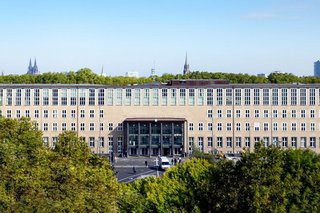The German Research Foundation (DFG) has announced that two proposals for new Clusters of Excellence at the University of Cologne were successful in its preliminary evaluation and are now asked to submit full proposals. In addition, all four existing Clusters of Excellence at the University of Cologne will submit subsequent applications for the new funding period. The draft proposals for the new Cluster of Excellence initiatives were submitted in May 2023 and reviewed in fall 2023. All full proposals, including those for the existing Clusters of Excellence, must be submitted to the DFG by August 2024.
“We are very pleased about the positive evaluations of our new cluster initiatives,” said Professor Joybrato Mukherjee, Rector of the University of Cologne. “I would like to thank all those involved who have contributed to this. We will also remain in dialogue with those who were not included in the next round of the competition.”
The following Cluster of Excellence initiatives are invited to submit full proposals:
- Sharing a Planet in Peril: The initiative ‘Sharing a Planet in Peril’ from the field of environmental humanities and social sciences investigates the causes and consequences of global environmental change and seeks answers to its challenges in cooperation with scholars and scientists particularly from the Global South.
- Our Dynamic Universe: The structure and evolution of the universe are controlled by countless phenomena that occur on very different time scales – from fractions of a second to billions of years. The proposed Cluster of Excellence combines astrophysical processes through a combination of observations with new instrumentation, theory in conjunction with novel simulation and data science methods and laboratory astrophysics with the aim of fully describing the time evolution of the matter and energy flow. The initiative is a cooperation of the universities of Cologne and Bonn.
The existing Clusters of Excellence submitting a renewal proposal are:
- In times of an aging society, the Cluster of Excellence CECAD is researching ageing processes and age-associated diseases. The scientists are investigating the molecular and cellular processes underlying ageing in order to define potential new targets for the prevention, early detection and treatment of age-related diseases, thus promoting healthy ageing.
- CEPLAS: The Cluster of Excellence investigates how plants adapt to changing environmental conditions and how agriculture can profit from this knowledge. Heinrich Heine University Düsseldorf is the managing university. Further partners are Forschungszentrum Jülich and the Max Planck Institute for Plant Breeding Research.
- The Cluster of Excellence ML4Q aims to create new computing and network architectures using the principles of quantum mechanics. Quantum computers promise revolutionary computing capacity that enables technological applications far beyond the possibilities of conventional information technology. It is a cooperation of the University of Cologne, the University of Bonn, RWTH Aachen University and Forschungszentrum Jülich.
- ECONtribute is the only Cluster of Excellence in economics in Germany and is a joint initiative of the Universities of Bonn and Cologne with the participation of the Max Planck Institute for Research on Collective Goods. ECONtribute conducts research on markets, focusing on the intersections of business, policy and society. The aim of the scholars and scientists is to better understand challenges such as digital transformation, global financial crises, increasing inequality and political polarization, and to make recommendations on how political decision makers can develop evidence-based responses.
The funding decision on the Clusters of Excellence will be made in May 2025. The awarding of at least two Clusters of Excellence would qualify the University of Cologne to apply for the status of a University of Excellence.
Within the framework of the Excellence Strategy of the German federal and state governments, the selection of Clusters and Universities of Excellence is carried out according to criteria of scientific merit by the DFG and the German Science and Humanities Council. The strategy and the awarded funding are intended to strengthen Germany’s position as an outstanding research hub and its international competitiveness in the long term as well as increasing its international visibility.
Press and Communications Team:
Jan Voelkel
+49 221 470 2356
j.voelkelverw.uni-koeln.de
